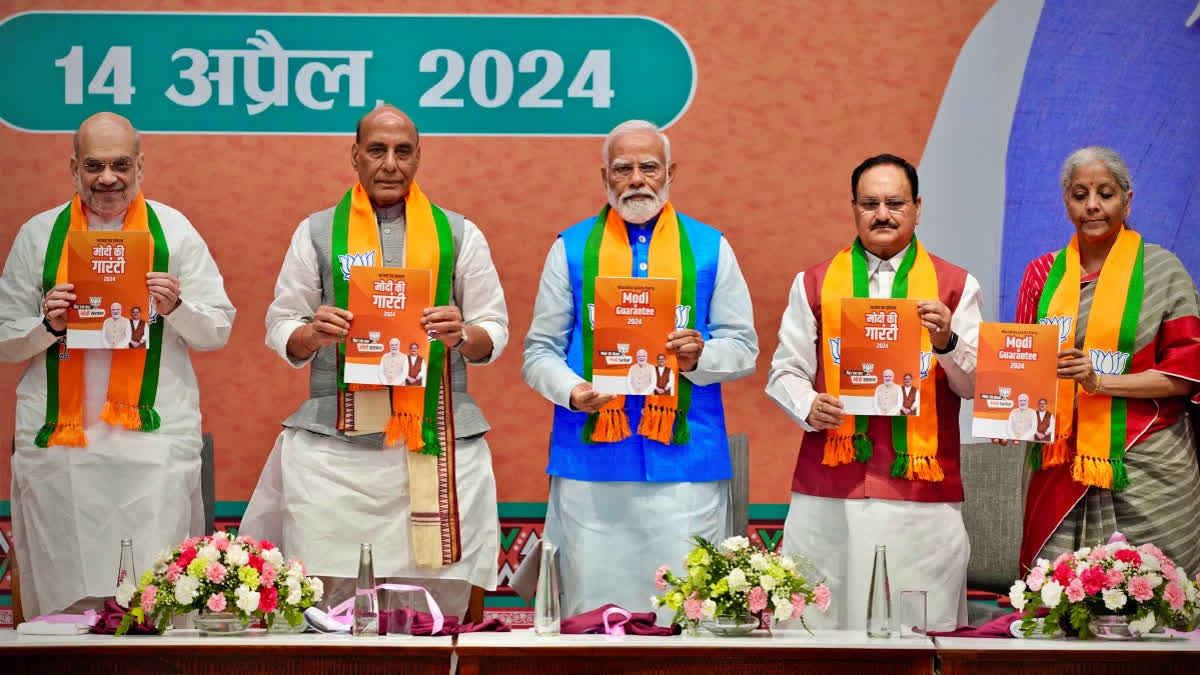Prime Minister Narendra Modi released the BJP's Lok Sabha poll manifesto in New Delhi on Sunday New Delhi: Prime Minister Narendra Modi released the BJP's Lok Sabha poll manifesto here on Sunday in the presence of party president J P Nadda, Home Minister Amit Shah, Defence Minister Rajnath Singh and other leaders.
Called the 'Sankalp Patra', The manifestofocuses on implementation of Uniform Civil Code and One Nation, One Election besides four pillars of 'Viksit Bharat' - women empowerment, youth power, farmers and the poor.
“The manifesto focuses on four pillars ofViksit Bharat -- women power, youth power, farmers and the poor. It (manifesto) focuses on the dignity of life and the quality of life, the quantity of opportunity as well as the quality of opportunity. The government will focus on taking piped gas to all homes and providing free electricity through solar power,” said Prime Minister Modi while releasing the election manifesto for 2024 Lok Sabha polls.
"BJP will start working on the promises made in the manifesto immediately after the results are declared on June 4," Modi said. "I present this Sankalp Patra of the BJP as a document of 'Modi ki Guarantee' to the people of the nation for their blessings," he said.
Union Home Minister Amit Shah, Defence Minister Rajnath Singh and BJP chief JP Nadda among others were present during the manifesto release ceremony at the BJP headquarters in Delhi. The BJP, in its manifesto, said that 2025 will be “Janjaatiya Year”. One of the major focuses in the manifesto is “One Nation, One Election” and “single electoral roll”.
Reiterating its intention to make India the third-largest economy in the world, the BJP manifesto set the goal of making India a “global manufacturing hub. The manifesto talks about ‘Virasat Se Vikas‘ and for the Ramayan Utsav to be celebrated across the world, promising more development in Ayodhya. The BJP manifesto also talks about bringing laws against paper leaks, education policy and hosting the Olympics in 2036.
The manifesto guarantees to make three crore more Lakhpati Didis. It aims to bring more awareness on cervical cancer, increased number of washrooms for women and the implementation of the Mahila Shakti Vandan Act. Migrant labourers and people under similar category will be linked to the e-Shram portal and they will be able to validate facilities provided under it, the manifesto said.
Here are the key highlights of the BJP's 'Sankalp Patra' for the 2024 parliamentary polls:
- Free ration for the poor for the next five years under the Prime Minister Garib Kalyan Anna Yojana.
- The party will continue to provide free and quality healthcare services of up to Rs 5 lakh to poor families under the Ayushman Bharat scheme.
- Free electricity to poor households under the Prime Minister Surya Ghar Muft Bijli Yojana.
- Efforts to empower three crore rural women to become "Lakhpati Didis".
- Integration of women self-help groups (SHGs) with the service sector, enhancing market access for women SHG enterprises:
- Ensuring development of infrastructure, such as working women's hostels and creches, with a specific focus on locations near industrial and commercial centres to facilitate increased participation of women in the workforce.
- Expansion of the existing health services, focusing on prevention and reduction of anaemia, breast cancer, cervical cancer and osteoporosis, ensuring a healthy life for women.
- Launching a focused initiative to eliminate cervical cancer.
- Implementation of the Nari Shakti Vandan Adhiniyam to ensure representation of women in Parliament and the state legislatures.
- A transparent government recruitment system.
- Enactment of a law to prevent paper leaks.
- Expansion of the Ayushman Bharat Yojana to cover senior citizens and provide them access to free and quality healthcare. Delivery of government services at doorsteps to ensure seamless access to social security benefits and other essential government services for senior citizens by leveraging the extensive reach and reliability of the postal and digital network.
- Strengthening the Prime Minister Kisan Samman Nidhi scheme to provide sustained financial support to farmers.
- Strengthening the Prime Minister Fasal Bima Yojana through more technological interventions to ensure speedy and more accurate assessment, faster payouts and quicker grievance resolution.
- Increasing the minimum support price (MSP) for crops.
- Launching the Krishi Infrastructure Mission for integrated planning and coordinated implementation of agri-infrastructure projects like storage facilities, irrigation, grading and sorting units, cold-storage facilities and food processing.
- Expansion of irrigation facilities, launching technology-enabled irrigation initiatives to implement cutting-edge technology for efficient water management.
- Launching an indigenous "Bharat Krishi" satellite for farm-related activities like crop forecasting, pesticide application, irrigation, soil health and weather forecasting.
- A periodic review of the national floor-level minimum wages.
- Inclusion of autorickshaw, taxi, truck drivers and other drivers in all social security schemes.
- Empowerment of small traders and MSMEs through the Open Network for Digital Commerce (ONDC) to help them expand their businesses using technology.
- A focused approach for tribal healthcare, measures to eliminate malnutrition among tribal children and providing comprehensive healthcare services in tribal areas on a mission mode.
- Measures to eliminate sickle-cell anaemia.
- "Modi ki Guarantee" for a secure and prosperous Bharat.
- Robust infrastructure along the borders, technological solutions on the fenced portions to make fencing smarter.
- Implementing the Citizenship (Amendment) Act (CAA).
- Making India the third-largest economy in the world.
- Expansion of employment opportunities.
- Measures to make India a global manufacturing hub in various sectors, including electronics, by 2030.
- "Modi ki Guarantee" on good governance.
- Bringing a Uniform Civil Code.
- Making "One Nation, One Election" a reality.
- Quality education, establishing new institutions of higher learning.
- Balanced regional development, maintaining peace in the northeast.
- Resolution of interstate border disputes among the northeastern states through sustained efforts.
